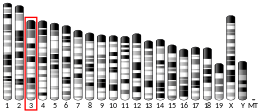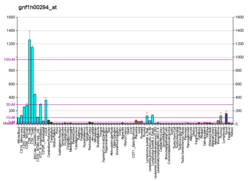PAG1
Phosphoprotein associated with glycosphingolipid-enriched microdomains 1 is a protein that in humans is encoded by the PAG1 gene.[5][6]
The protein encoded by this gene is a type III transmembrane adaptor protein that binds to the tyrosine kinase csk protein. It is thought to be involved in the regulation of T cell activation.[6]
Interactions
PAG1 has been shown to interact with FYN,[5] C-src tyrosine kinase,[5] Sodium-hydrogen antiporter 3 regulator 1[7] and Abl gene.[8]
gollark: BEE Grafana.
gollark: Well, this is extremely awful.
gollark: Oh, okay then.
gollark: Am I safe if there's no unauthenticated access to any graphs?
gollark: It wasn't very clearly documented.
References
- GRCh38: Ensembl release 89: ENSG00000076641 - Ensembl, May 2017
- GRCm38: Ensembl release 89: ENSMUSG00000027508 - Ensembl, May 2017
- "Human PubMed Reference:". National Center for Biotechnology Information, U.S. National Library of Medicine.
- "Mouse PubMed Reference:". National Center for Biotechnology Information, U.S. National Library of Medicine.
- Brdicka T, Pavlistová D, Leo A, Bruyns E, Korínek V, Angelisová P, Scherer J, Shevchenko A, Hilgert I, Cerný J, Drbal K, Kuramitsu Y, Kornacker B, Horejsí V, Schraven B (May 2000). "Phosphoprotein associated with glycosphingolipid-enriched microdomains (PAG), a novel ubiquitously expressed transmembrane adaptor protein, binds the protein tyrosine kinase csk and is involved in regulation of T cell activation". The Journal of Experimental Medicine. 191 (9): 1591–604. doi:10.1084/jem.191.9.1591. PMC 2213442. PMID 10790433.
- "Entrez Gene: PAG1 phosphoprotein associated with glycosphingolipid microdomains 1".
- Brdicková N, Brdicka T, Andera L, Spicka J, Angelisová P, Milgram SL, Horejsí V (October 2001). "Interaction between two adapter proteins, PAG and EBP50: a possible link between membrane rafts and actin cytoskeleton". FEBS Letters. 507 (2): 133–6. doi:10.1016/S0014-5793(01)02955-6. PMID 11684085.
- Wen ST, Van Etten RA (October 1997). "The PAG gene product, a stress-induced protein with antioxidant properties, is an Abl SH3-binding protein and a physiological inhibitor of c-Abl tyrosine kinase activity". Genes & Development. 11 (19): 2456–67. doi:10.1101/gad.11.19.2456. PMC 316562. PMID 9334312.
Further reading
- Wen ST, Van Etten RA (October 1997). "The PAG gene product, a stress-induced protein with antioxidant properties, is an Abl SH3-binding protein and a physiological inhibitor of c-Abl tyrosine kinase activity". Genes & Development. 11 (19): 2456–67. doi:10.1101/gad.11.19.2456. PMC 316562. PMID 9334312.
- Brdicková N, Brdicka T, Andera L, Spicka J, Angelisová P, Milgram SL, Horejsí V (October 2001). "Interaction between two adapter proteins, PAG and EBP50: a possible link between membrane rafts and actin cytoskeleton". FEBS Letters. 507 (2): 133–6. doi:10.1016/S0014-5793(01)02955-6. PMID 11684085.
- Tedoldi S, Paterson JC, Hansmann ML, Natkunam Y, Rüdiger T, Angelisova P, Du MQ, Roberton H, Roncador G, Sanchez L, Pozzobon M, Masir N, Barry R, Pileri S, Mason DY, Marafioti T, Horejsí V (January 2006). "Transmembrane adaptor molecules: a new category of lymphoid-cell markers". Blood. 107 (1): 213–21. doi:10.1182/blood-2005-06-2273. PMID 16160011.
- Jiang LQ, Feng X, Zhou W, Knyazev PG, Ullrich A, Chen Z (September 2006). "Csk-binding protein (Cbp) negatively regulates epidermal growth factor-induced cell transformation by controlling Src activation". Oncogene. 25 (40): 5495–506. doi:10.1038/sj.onc.1209554. PMID 16636672.
- Takeuchi S (June 2006). "Expression and purification of human PAG, a transmembrane adapter protein using an insect cell expression system and its structure basis". The Protein Journal. 25 (4): 295–9. doi:10.1007/s10930-006-9015-6. PMID 16947079.
- Roberts AE, Araki T, Swanson KD, Montgomery KT, Schiripo TA, Joshi VA, Li L, Yassin Y, Tamburino AM, Neel BG, Kucherlapati RS (January 2007). "Germline gain-of-function mutations in SOS1 cause Noonan syndrome". Nature Genetics. 39 (1): 70–4. doi:10.1038/ng1926. PMID 17143285.
- Smida M, Posevitz-Fejfar A, Horejsi V, Schraven B, Lindquist JA (July 2007). "A novel negative regulatory function of the phosphoprotein associated with glycosphingolipid-enriched microdomains: blocking Ras activation". Blood. 110 (2): 596–615. doi:10.1182/blood-2006-07-038752. PMID 17389760.
This article is issued from Wikipedia. The text is licensed under Creative Commons - Attribution - Sharealike. Additional terms may apply for the media files.




